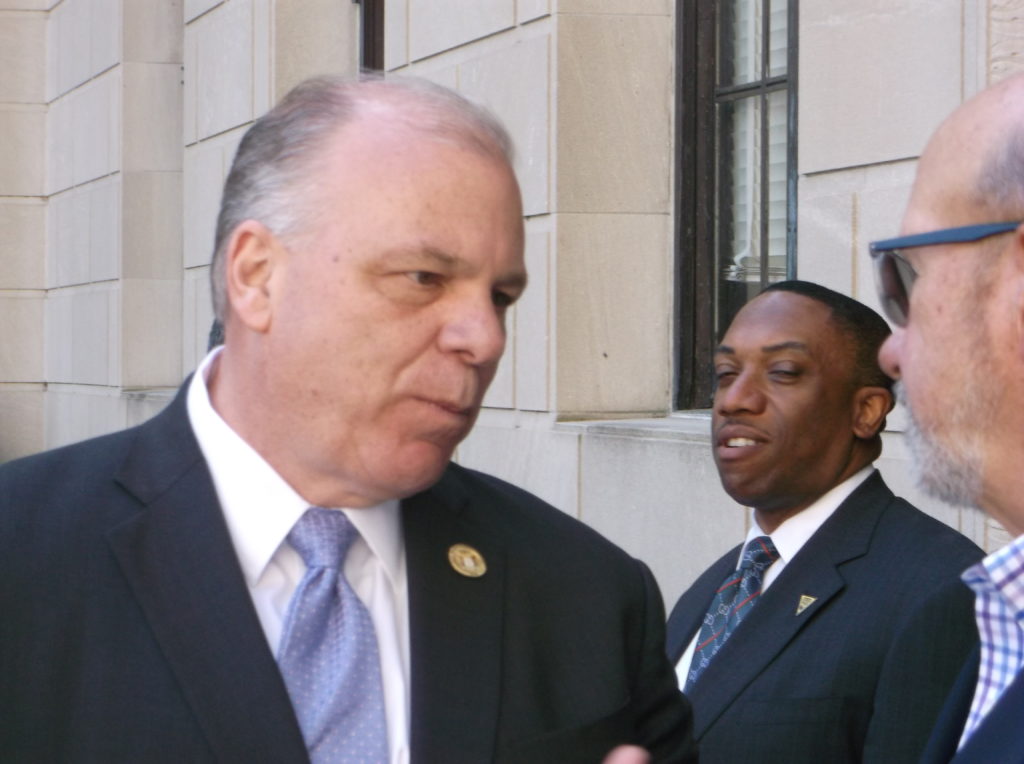Translation: An Embarrassing Defeat on the Floor of Either or Both Houses was Virtually Certain

It was an idea whose time hadn’t come. It was moreover an idea ill-conceived, poorly planned and disastrously executed.
The 11th hour effort by the Democratic legislative leadership to dramatically change — via a constitutional amendment — the procedure to re-draw legislative district lines drew fierce and immediate opposition from Gov. Phil Murphy as well as public interest groups who are normally reliable Democratic supporters. Even a former Attorney General of the United States weighed in, criticizing the proposal as placing political interests above the public interest.
After more than a week of increasingly harsh criticism and ominous signs that the proposal threatened to splinter the party, Senate President Steve Sweeney (D-Gloucester) and Assembly Speaker Craig Coughlin (D-Middlesex) canceled a vote scheduled for Dec. 17, effectively delaying any further action until the 2019 session.
Both leaders issued obligatory statements, pledging to consider the position of the opponents while continuing to work to implement a system which they said more fairly represented the political composition of the state as a whole.
Translation: An embarrassing defeat on the floor of either or both houses was virtually certain, handing the governor a high-profile victory in the ongoing power struggle between his Administration and the legislative leaders.
Sweeney and Coughlin were left with no option but to retreat and hope to fight another day, perhaps after tweaking the original proposal and expending greater effort to build a broad-based constituency in its behalf.
The leaders and their supporters were never able to successfully rebut the argument driven by the opposition that the amendment was a naked power grab to cement Democratic dominance in the Legislature while, at the same time, seriously diminish the power and influence of the state party establishment and the governor.
Their last-minute rush to secure the amendment’s passage before the current session expired merely added to the suspicion that it was the product of a backroom deal — as Murphy alleged — and that more orderly and sober consideration would reveal significant flaws and shortcomings.
As proposed, the amendment would increase the re-districting commission membership from 11 to 13, but most crucially shift eight of the appointments to legislative control and reduce the authority of the respective state party chairs to name two members each, down from five each under the existing process. The Chief Justice of the State Supreme Court would continue to appoint the deciding vote in the event of a commission tie.
The proposed makeup would effectively place control of the outcome of the commission’s work in the hands of Legislative leaders.
It is by no means a stretch to envision the eight legislative appointees arriving at a private accommodation suitable to their partisan political interests and, holding two-thirds of the total commission membership, outvoting and marginalizing the members selected by the state party chairs.
Under the guise of introducing greater competitiveness in legislative elections, the amendment establishes a formula under which 10 of the 40 districts must be drawn to within five points of the average statewide votes for President, United States Senate and Governor over the last ten years.
Democrats currently hold a statewide voter registration edge of nearly one million over Republicans; a Republican hasn’t won a Senate election in 46 years and a Republican presidential candidate hasn’t carried the state in 30 years.
Given that history, a re-districting formula based on that metric virtually guarantees Democratic victories and a lock on control of the Legislature for years.
It was quickly viewed as gerrymandering dressed up in competitiveness clothing.
The leadership decision to delay any further action until next year represented one of those rare moments in legislative history when a public outcry was so broadly heard that it led to a complete withdrawal.
It represented also a serious miscalculation on the part of the leadership, a mistaken conviction that the idea could be sold easily and quickly as sound public policy.
As a result of its complexity and because it involved the internal functioning of government, it was believed the proposal would not be scrutinized closely by voters.
The leaders were clearly taken aback by the onslaught of criticism, not merely from Republicans who feared — and rightly so — they were about to be consigned to permanent minority status, but from progressive, Democratic-oriented groups whose outrage ran so white hot they had no fear of laying into the party leadership in exceedingly blunt terms.
For Murphy, the leaders backing down was a bright spot for him in a year when such spots were rather rare. Two of his major agenda items — legalization of marijuana possession in small amounts for personal use and increasing the minimum wage to $15 per hour — encountered unanticipated political pushback and won’t be considered until sometime next year.
The failure to secure passage of either initiative in his first year was seen as a sign of his Administration’s naivete and an inexperienced staff incapable of understanding and navigating the political cross currents of the legislative process.
While the leadership may not abandon the redistricting proposal altogether, its future is in considerable doubt. To achieve placement on the ballot on 2019 would require a three-fifths vote in both houses — not impossible but certainly more difficult that the simple majorities that would have been required this year and next.
Sweeney and Coughlin may have bowed to the inevitable in canceling a vote this year, but it’s highly problematic that 2019 will be the year in which the idea’s time has arrived.
They may have learned a valuable lesson in planning and execution, but if they are unwilling to accept major revisions in the proposed amendment, the lesson won’t mean much.
Carl Golden is a senior contributing analyst with the William J. Hughes Center for Public Policy at Stockton University.










Leave a Reply